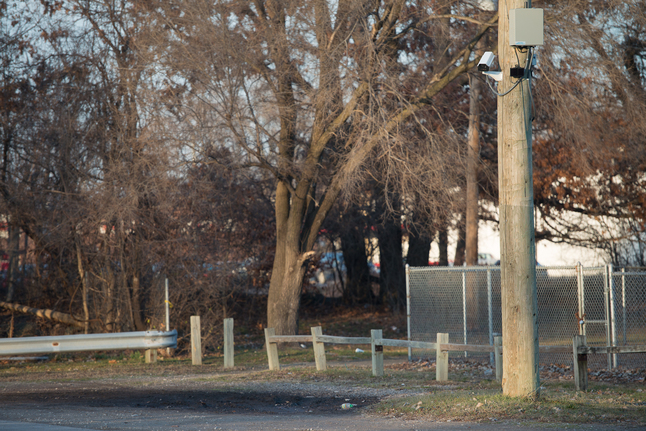
Ypsilanti Township has added cameras over the past year including this one in Harris Park.
Courtney Sacco | AnnArbor.com
Police call them security cameras and maintain they are a great help with investigations.
Organizations like the American Civil Liberties Union prefer to call them surveillance cameras and say they are an invasion of privacy.
The word surveillance hints at a population being monitored. The word security implies the cameras are just another safety measure and are there for the citizens' own good.
Despite the debate, cameras continue to pop up more and more in Washtenaw County. Programs in Ypsilanti Township and on the Eastern Michigan University campus are expanding. The University of Michigan also employs cameras on its campus. Other area law enforcement agencies like the Ann Arbor Police Department don’t have them now - but aren’t ruling out their use in the future.
In Ypsilanti Township, cameras were first installed in the West Willow neighborhood in 2011. The program expanded this past September to the Smith-Lakeview area off of Grove Road.
Twenty years ago, there were 14 cameras on EMU’s campus. Now there are 500, said EMU police Chief Bob Heighes.
“It has helped us solve some crimes,” he said.
ON CAMPUS
EMU police point to one recent instance where cameras played a part in solving a crime.
Last month, cameras helped EMU police get to the bottom of a reported armed robbery. A 21-year-old student told police he was robbed by four men in the Green Lot on the northern edge of campus near Huron River Drive. He told police they had a handgun and punched him in the face after taking his wallet.
What was recorded on cameras that cover that area, however, told a different story. There is currently a warrant out for the student’s arrest for filing a false report of a felony.
Heighes said there are 500 cameras that cover just about the entire campus. What used to be a small operation has grown into a million dollar operation. There are both exterior and interior cameras all over campus. Relatively new are video stations near emergency phones at building entrances where a student can call and see and be seen by someone at the police department.
“It’s been an ongoing process,” said Heighes. “The university has made a huge investment into it.” The cameras are not constantly monitored, but the footage comes in handy to review when police are looking into a crime.
“We use them when we have a crime to investigate,” Heighes said. “They’re very good. We’ve been able to give officers locations and descriptions.”
Heighes stressed that the cameras don’t catch the criminals -- it still takes detective work - but the information from the cameras is of great assistance to investigators. It helps police identify people in the area or get a description of where a crime occurred.
Fourteen more cameras were expected to go online at EMU’s College of Business at the end of November.
As far as privacy issues are concerned, Heighes said none of the cameras are trained in residential rooms.
“We’re not prying into private areas,” he said.
U-M also has cameras on campus, though officials did not want to give a specific number of how many. Diane Brown, spokesperson for the U-M Police Department, said campus cameras were mostly at the entrances and exits of residence halls.
Brown said the cameras are not really intended to catch students.
“It’s people coming in to prey on the students,” she said.
In 2009, a camera helped catch a suspect in an arson case on campus.
“We were able to get an image off one of the cameras and put it on a wanted poster,” Brown said.
IN THE NEIGHBORHOOD
A college campus is not the same as a neighborhood, however. Having a camera trained on public university property is arguably a little different than having it recording private residences.
Regardless, the program started in Ypsilanti Township in 2011 and expanded this year has helped catch at least one criminal.

Police used this photo from a West Willow camera that helped catch a sex assault suspect.
The cameras in West Willow and Smith-Lakeview area take quick still photos and help officers with descriptions and identifications, according to police.
“The cameras have measured up to be what we expected them to be,” said Lt. Jim Anuszkiewicz of the Washtenaw County Sheriff’s Office. “I see law enforcement and cameras moving in the same direction. The camera systems will make the neighborhood safer.”
The cameras didn’t come at the request of the sheriff’s office, however. They were the result of political action on the township board.
“I think Ypsilanti Township is being proactive,” Anuszkiewicz said. “It should be commended. My hope would be that the township continues to expand that program. Technology is key in this day and age.”
The cameras have not been an issue with residents, Anuszkiewicz said.
“We’ve received a positive reaction from the local residents,” he said. “The sheriff’s office has not received any complaints about privacy issues.”
The people in West Willow AnnArbor.com spoke with neither fully embraced nor rejected the presence of the cameras.
"It could be a good thing," said West Willow homeowner Timothy Hetfinger. "It depends if it's to help you, or to work against you (and) providing they (are) here to benefit my safety, not to impede on my rights and my freedoms. I'm kind of worried about that because I don't think that's what it is sometimes. It's a catch-22 situation. You have to find a medium."
Hetfinger, who is white, thinks cameras are sometimes used to unfairly target African-American communities.
"That stuff has to end," he said. "It still goes on till this day."
LaShan Bell, of Romulus, visits her grandmother in the neighborhood everyday. She thinks cameras are no substitute for more of a physical police presence.
"Besides cameras, they need some kind of security riding around here," she said. "I think it would be better than cameras."
The story is a little different in Ann Arbor and Pittsfield Township, where there are currently no cameras. That doesn’t necessarily mean there will never be.
“If a technique such as cameras can be shown to be effective in improving public safety and it does not negatively impact our ability to work together with the community, then it is something that could be considered,” said Ann Arbor police Chief John Seto.
In Pittsfield Township, the public safety department is exploring teaming up with apartment complexes, which might have cameras of their own.
“We do not currently have cameras deployed publicly, but we have done some initial research into partnering with some apartment complexes to further enhance their preventative safety measures,” said Matt Harshberger, Pittsfield Township Director of Public Safety.
SOMEBODY’S WATCHING YOU?
There are concerns however. The ACLU released a report in October that claims cameras placed in a residential area of Lansing don’t only undermine the residents’ privacy, but are also ineffective and expensive.
Michael Steinberg, the legal director for the ACLU of Michigan, said his organization is extremely concerned with communities being under surveillance.
“We don’t want to become a Big Brother society,” he said. “We live in a free society. We don’t live in China or Syria. We don’t want to become a police state.”
There are other concerns, too. Steinberg said there have been instances where male police officers abuse the camera systems, such as using them to harass ex-wives and girlfriends. The sophistication of new video technology is also disturbing, according to Steinberg.
“They can watch kids playing in their yards,” he said. “We think it violates our privacy.”
In Ann Arbor, a proposed ordinance that would restrict cameras has been in the works for two years. The Students Against Surveillance, an organization at U-M co-founded by William Leaf, who has since graduated, introduced the ordinance in 2010. Leaf now heads up the group Ann Arbor Privacy, which continues to push for it.
Leaf hopes the ordinance, which wouldn’t necessarily ban cameras, still has life. He said the two Ann Arbor City Council members from the Fifth Ward - Mike Anglin and Chuck Warpehoski - have shown support for the ordinance, which has yet to reach council for a vote.
“Getting city council to act before there is a problem is difficult,” Leaf said. “Few people want to take a stand on something that is controversial and can be delayed.”
The ordinance would allow cameras for short-term surveillance - 15 days or less - under certain conditions. The public would also need to be notified of where the cameras were located. The ordinance calls for signs marking the presence of cameras, as well.
“We want to allow temporary cameras in high-crime areas, but ban permanent neighborhood cameras without residents’ consent,” Leaf said. “The ordinance would be a model for other cities.”
John Counts covers cops and courts for AnnArbor.com. He can be reached at johncounts@annarbor.com or you can follow him on Twitter.